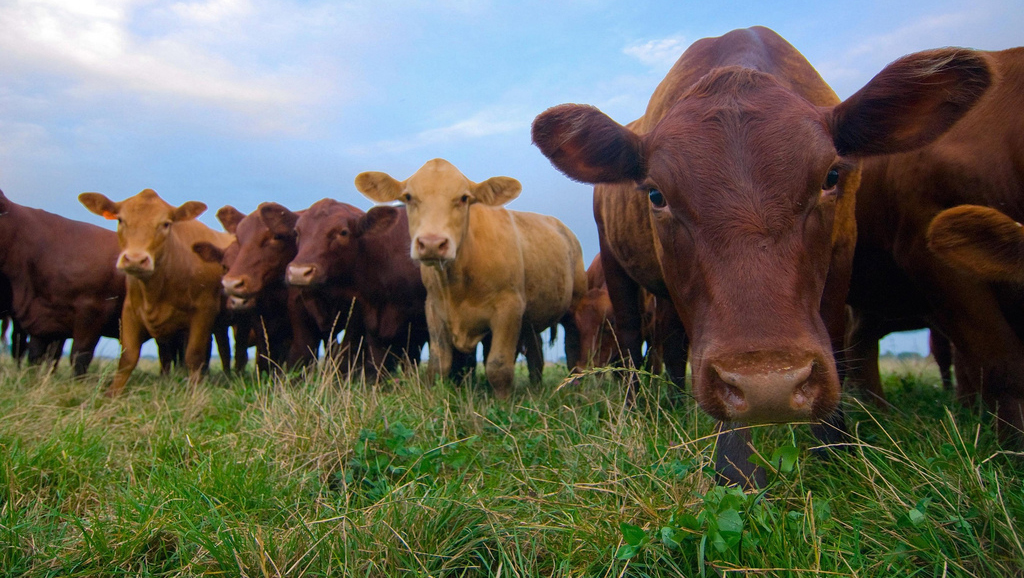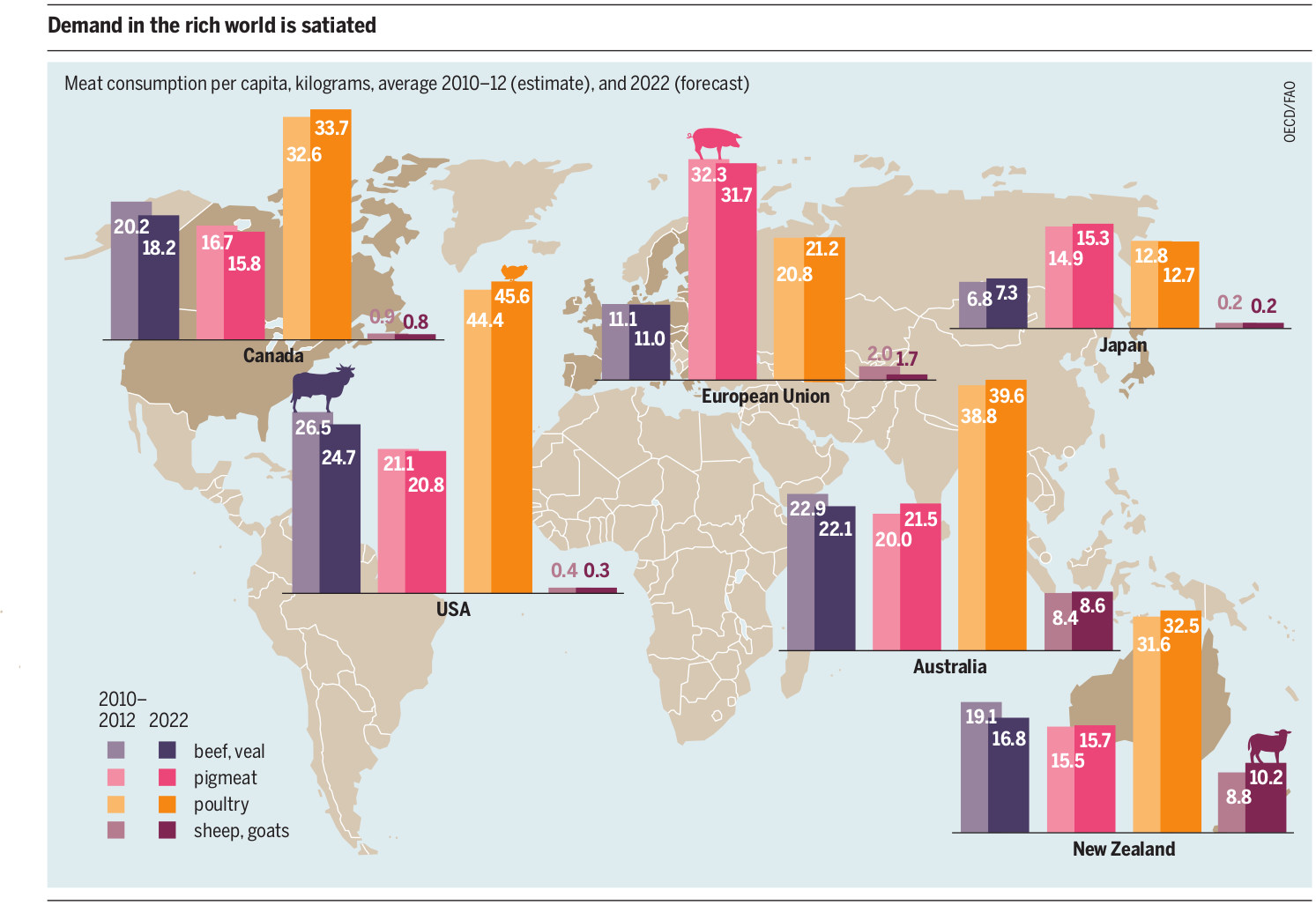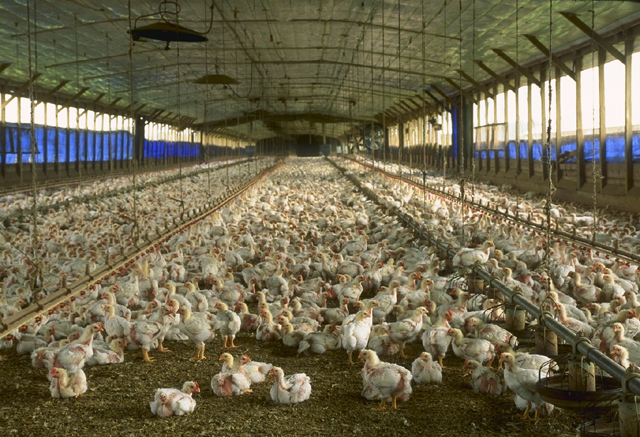
The UN-FAO reports 26% of the planet’s ice-free land is used for livestock grazing. (Ryan Thompson/U.S. Department of Agriculture)

The UN-FAO reports 26% of the planet’s ice-free land is used for livestock grazing. (Ryan Thompson/U.S. Department of Agriculture)
Not to be a downer, but there’s a strong possibility that what you ate for lunch today has contributed to not only global warming, but global hunger as well — especially if what you ate contained meat.
That’s pretty heavy news to stomach with your burger, but the evidence is mounting. According to the Food and Agriculture Organization of the UN, 14.5% of all greenhouse gas emissions come from the production of livestock.
Our current world population is hovering around 7.5 billion people, but more than 800 million of which are dealing with hunger – or, one in nine. And even more — one in three — are suffering from malnutrition.
This seemingly contradicts reports, like this study from McGill University and University of Minnesota, that show we grow enough food to feed 10 billion people.
You may wonder how those going hungry can get their piece of the agriculture pie — and where all that extra food is going.
Researchgate reports that a majority of crops such as wheat and corn, are used in the creation of biofuels and the cultivation of livestock. From an outsider’s point of view, it appears wealthy countries have prioritized the meat and automobile industries over feeding those in need.
Perhaps surprisingly, it’s not the availability of food that causes world hunger but, rather, poverty. The UN-FAO also found that most of the world’s poor population lives in rural areas in which they are subsistence farmers, meaning they only produce enough for their family to survive — and that’s only if everything goes right during the growing season.
So how does eating meat contribute to global poverty and, hence, global hunger? It comes down to supply and demand. As developed countries and developing countries continue to demand more meat, farmers will need to utilize more land to fulfill these needs.
The UN-FAO reports 33% of all cropland is used for livestock feed, as well as 26% of all the earth’s ice-free land is used for grazing purposes. To provide the heavily demanded animal products, the livestock industry also uses one third of the earth’s freshwater supply, according to the Proceedings of the National Academy of Sciences of the United States of America.
As more land and water is utilized to create animal products, that creates a scarcity in land and water for poor people in developing countries. This scarcity causes the prices of land and water to increase, making it harder for poor populations to gain access to these resources.

If the western world wants to solve the problem of world hunger, we must correct our own eating habits first. The more meat we demand on a regular basis means that there is less food and water available on the earth. It takes about 1,799 gallons of water to produce 1 pound of beef — the equivalent of about 22 bathtubs full of water, or more than three weeks of baths every day — according to Food Tank. In comparison, the 108 gallons of water it takes to make one pound of corn doesn’t seem so bad.
The meat industry isn’t just a strain on the water supply, it is also a strain on the atmosphere as well. One ton of methane gas has the same greenhouse effect as 23 tons of carbon dioxide. And according to The Conversation: “Around 1.6-2.7 billion tonnes of greenhouse gases each year, mostly methane, are produced from livestock digestion. Another 1.3-2.0 billion tonnes of nitrous oxide come from producing feed for livestock. And the final 1.6 billion tonnes comes from land use changes, such as clearing for animal pastures.”
In a perfect world, upon learning this, everyone would eat a vegan diet to use less of the Earth’s resources, and increase the availability of said resources to those who are starving, while simultaneously cutting greenhouse gas emissions. Of course, worldwide veganism is an unrealistic goal — not to mention this would cause other economic issues, based on the all the industries this change would impact.

Instead, individuals could try to minimize their consumption of meat. Americans, here’s a thought: Maybe we don’t need beef every single day, let alone put bacon on everything.
Again, we go back to supply and demand. If consumers demand less meat, those resources could be directed toward other food avenues, which increases the chances of starving populations to obtain food security.
World governments also could be taking action. A scientific analysis published in the journal Nature Climate Change, suggests implementing an emissions tax on the meat industry would change consumption patterns.
But influencing human behavior is a difficult task. Egalitarians may take personal responsibility for the impact our eating habits have on others and the earth. However, it is just as unrealistic to expect a worldwide adoption of veganism as it is to assume most individuals would consider their daily actions through an egalitarian lens.
However, if we truly want to help ease world hunger and reduce our impact on climate change, we must modify our eating habits on an international scale – and having governments around the world adopt emissions taxes on meat is one way to help accomplish that change.
Prior to the industrial revolution, most societies did not consume meat on a daily basis, unless you’re family was amongst the elite class. Only in the modern era of human consumption have we forgotten that meat is supposed to be a luxury, not a necessity. World hunger and climate change are strong reminders that such indulgences do not come without consequence.